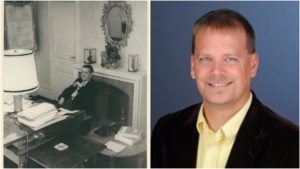
Cracks of History – Colin Roust on Uncovering Often Ignored Composer & Opera Impresario George Auric
By David SalazarEver heard of Georges Auric?
Unfortunately, few have. And Colin Roust, Assistant Professor in Musicology at the University of Kansas, believes that that needs to change. And he’s doing something about it, writing a full-length biography about Auric, “George Auric: A Life in Music and Politics” which will be published by Oxford University Press in 2018. Roust recently won a research grant from the American Philosophical Society to complete his research in France and Monaco this summer.
Roust’s interest in the composer came from his own fascination with Paris between the two World Wars.
“I was looking around for a topic in Grad school and I kept coming back to Auric, because of his film work and because there wasn’t much on him. I continued working on the political elements of his career and the way his personal politics shape his musical aesthetic,” the Assistant Professor explained.
So why is Auric so important?
A Visionary
“He was a major figure in 20th century French art and he’s connected to opera in a number of ways,” Roust told OperaWire in a recent interview. “It’s unfortunate that he’s fallen through the cracks of history.”
For starters, Auric was born on Feb 15, 1899 and lived until July 23, 1983. During his lengthy life he was a well-regarded composer, but more importantly, he ran the Réunion des Théâtres Lyriques Nationales (Opéra National de Paris and Opéra-Comique) between 1962-1968.
“He played a massive role in changing the nature of the Paris Opera. He changed a number of rules for the performers. Prior to his tenure, high-profile performers on the roster of the Opéra could draw their annual salaries despite spending the entire season on the road performing in other houses around the world. Without the top performers in residence, the quality of performances at the Palais Garnier suffered. Auric curtailed the practice significantly, raising the quality of performances and restoring the company’s international reputation,” Roust explained. “At the same time, other changes involving chorus members and the orchestra were implemented and he was able to get the Opéra’s budget in the black for the first time since before World War I.”
Bringing A Masterwork to Paris
One of his greatest achievements revolved around a beloved operatic masterwork that has become a staple of every major company around the world. But back in the mid-1900s, the Opéra National de Paris was not particularly receptive to certain operas.
“When he took over as the administrator, one of the things he said was that if they could not put together the French premiere of ‘Wozzeck’ within a year, he would walk out and quit the job,” Roust explained. “He found it a shame that 40 years after the premiere, ‘Wozzeck’ had never been performed in France. It was an opera that he considered the greatest masterwork of the twentieth century.”
And sure enough, Auric made it happen, the premiere coming in 1963 with Pierre Boulez making his big breakthrough as a conductor in France.
Other major achievements include getting legendary diva Maria Callas to appear with the company in “Norma,” and the commission for Marc Chagall’s now-iconic ceiling at the Palais Garnier. As the head of the Réunion des Théâtres Lyriques Nationales, Auric commissioned it from the famed painter and led the unveiling ceremony on August 31, 1964.
Some Difficulties
But it wasn’t all rosy for Auric as the main man at the Opéra National de Paris.
“He was unpopular with orchestral musicians in terms of pushing the union rules,” added Roust. “It always surprised me that he was affiliated with the communist party throughout his life and always interested in supporting musicians. But as an administrator he constantly ran afoul of the unions. He faced a lot of resistance.”
A Composer
As a composer, he is best known for his work in the film industry, writing music for such films as “Beauty and the Beast (1946),” “Orpheus (1950),” “Moulin Rouge (1952),” and “The Hunchback of Notre Dame (1956),” among many others.
But he also composed a number of operas and operettas.
“The scores are not easy to track down so the information is not readily available,” Roust noted before talking about how Auric was once commissioned to work on the recitatives for a Gounod opera. He was commissioned alongside Poulenc and Satie, and while those two had no issues with the Gounod family, Auric’s composition was so utterly disliked that his work was never allowed to be performed.
His other operatic works include “Sous le masque (1925–37),” a one-act opéra-comique with a libretto by Louis Laloy; “Zadig ou Astarté perdue et retrouvée (1926–29),” the libretto of which was to be adapted by André Coeuroy and Claude Aveline from Voltaire’s novel; and “Sans façons (1928–29),” a three-act operetta with a libretto by Jean Alley on the myth of Menelaus. Of these, only “Sans façons” has ever been performed, though it was pulled from the stage after only seven performances and Auric would later deny that it ever existed.
“All three operatic works date from a key moment in Auric’s life as he transitioned from child prodigy to mature adult composer,” Roust noted. “Although he tried to draw on his numerous successes as a composer of incidental music for avant-garde plays, those lessons seem to have been better applied in his film scores, the first of which he composed in 1930.”
As Roust continues his exploration of Auric, he finds him ever-engaging, not just because of his operatic background but because of his overall influence.
“I love how present he is for what is going on in 20th century music. When we read about music in the 20th century in France, he’s always mentioned—though sometimes only in the footnotes. He knew everybody.”


